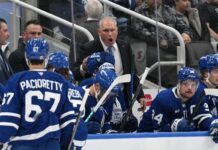
Writer and columnist Adam Proteau has been with The Hockey News since 1999. He is a frequent contributor to radio — including his role as host of THN’s Radio Show on XM Satellite Radio — and TV programs across North America and won the Professional Hockey Writers Association’s award for best column in 2005-06.
Adam took some time from his busy schedule to answer some of our questions. This is an interview we did earlier this year and since it’s pretty quiet on the Leafs front I thought it would be a good idea to publish it here since I never published the English version of the interview. Links below.
It has been 13 years since you first joined the Hockey News. What does covering the game of hockey mean to you personally? What are the main talking points that get you going for a new NHL season?
Covering the game means a chance to analyze and offer opinions on something that means more to my country than the political process. Not sure how healthy that is, but it—s the same in every country with one sport or another. But I do like examining hockey as a microcosm of the bigger society we live in, and point out the logical deficiencies that exist.
In terms of talking points, the changes that are made in the off-season always are a good entry point into each new season. Fans love change, and even though I—m not a fan in the traditional sense anymore, I—m the same in that sense.
What event would you characterize as your best experience as a hockey journalist?
I—d say the Winter Classic in Boston, mainly because I got to skate on the ice at Fenway before the game. Otherwise, I—m not really into the big events. My best experiences are getting to know the people behind the game, be they big stars or relatively unknown people. And I feel fortunate that I get to do that every day,
Concussions are a big problem in today—s NHL. They have been a problem for a long time now, but in light of the developments with Sidney Crosby that problem seems to have finally received proper recognition. Could you give us some of your thoughts on that issue?
It—s tough to trim down my thoughts on the most important issue in hockey to a couple sentences! The easy answer to this question is buy my book (kidding), but I—ll try.
First of all, Crosby—s saga has drastically raised awareness of the issue, but I still think the NHL hasn—t recognized the severity of the epidemic enough to take the rapid and wide-ranging steps that need to happen. The league remains in denial to a large degree and that isn—t likely to change until there—s a death on the ice, or until players launch a lawsuit against the league the way a group of retired NFLers have done recently.
There are many options to cutting down on concussions, including taking some of the increased speed out of the game, streamlining over-protective equipment and a total ban on head shots at the NHL level. I—d be ok with any and all of them, but the league is moving too slowly and cautiously to make a real difference right now.
What do you think makes concussions a more frequent occurrence in the NHL than in European or international hockey? Obviously, the rink size, less physical approach to the game and touch icing contribute to the decreased number of concussions but what are the other major factors?
The removal of the red line and crackdown on obstruction made the game much faster in the NHL and I think that plays a huge role. There—s also the hyper-aggression and predatory nature of the North American game that adds to it. And the lack of proper fines and suspensions here fails to make players accountable.
You—re a big spokesman for getting rid of the enforcer role, but what are your thoughts about fighting in general; does it still belong in the game of hockey?
I think there—s always going to be room for a spur-of-the-moment, organic fight in hockey, just as there is in any other sport. But the fighting industry in the North American game is an anachronism and should be eliminated completely.
There—s simply no reason to have a designated puncher on a hockey team. Really, there never was, but the lack of leadership at hockey—s top levels and the brainwashing of a generation into a romanticized notion of what fighting represents have given us what we have today: a situation where no clean checks can be thrown without a scrum, facewashing and fights. Then there are the phony fights the goons put on to justify their jobs. With all we know and continue to learn about the devastating physical and psychological trauma incurred by fighters, there—s no justification for it.
Do you think there will be another lockout? If so, how do you think the stoppage would impact the game in North America and the world?
I don—t think there will be total labor war that leads to a fully-lost season as we saw in 2004. But as we get closer to the end of this season, I do get less confident the season will start on time. If the league goes the lockout route again, they—ll deserve every ounce of hatred and nastiness cast their way, because it will be only about greed on the owners— behalf.
I think Canadians and traditional U.S. hockey markets would see the vast majority of fans return to the sport after any labor strife, but there would be damage done to non-traditional markets, and I wouldn—t be surprised to see contraction of one or two teams if that were to happen.
One thing that has increased the level of frustration of North American and European fans alike is the increased number of dives in world hockey. What can the NHL do to battle this issue?
Simple: they can increase the fines and/or suspensions for that behavior. Money is the only way to get players to change.
The image of a European born player in the NHL has changed drastically since some of the first imported players made their first strides on North American ice. Do you think it stems from their ability to adapt to the North American style of hockey or did their skill level just prove too valuable to ignore just because of long lasting stereotypes?
A little of both, really. The xenophobia you saw peaking in the 70s and 80s has faded because people realize how much Europeans have brought to the game and understand that no other sport places a premium on certain types of birth certificates or passports. All those people who needed to make boogeymen out of other countries to pump up their own nation have been revealed as dinosaurs who will look worse as time marches on.
In your mind, who is the greatest European born player to have the biggest impact on the North American game and why?
As a Toronto kid, I—m going to start by mentioning Borje Salming—s name, because he was skilled and tough as nails, and really paved the way for the guy I think is the greatest European ever — Nicklas Lidstrom.
Simply put, Lidstrom has risen to be considered right up there with Bobby Orr as one of the top two defensemen in history and his remarkable run grows more astonishing with each year there is no discernable drop-off in his play. He—s the best defenseman I—ve ever covered and I imagine I—ll ever cover. He makes it all look effortless when I know it is anything but. And he does it with class and grace to spare.
What makes Detroit such a good and fruitful environment for Europan born players?
Detroit is good for everybody, not just Europeans, because they have a great scouting and development team and a winning culture. Let—s face it, Europeans aren—t going to Michigan because it reminds them of home. There—s a history of respect for all players there that can—t be matched.
How much do you know about Croatian hockey, KHL MedveÅ¡Äak Zagreb and players with Croatian heritage who played in the NHL?
I—m sorry, but I don—t know much at all about Croatian hockey! Our focus at THN is on the NHL for the most part. But I—d love to learn.
Adam Proteau with Mislav Jantoljak
YOUR MORNING LINKS:
Mirtle looks at the Devils NY Rangers matchup, there is quite a lot of history there
UFA wishlist with Matt Carle on it, on The Leafs Nation
Vintage Leafs has some new pics for you to enjoy
VLM debating Phil’s commitment to the US national squad
Dale Hunter won’t return as Washington’s coach


![Craig Berube Post Game, Leafs 6 vs. Sabres 3: “Our team played really hard in front of [Murray]… They were dialed in for him” Craig Berube, Toronto Maple Leafs head coach](https://mapleleafshotstove.com/wp-content/uploads/2024/12/berube-leafs-tor-pg-218x150.jpg)





















![[Leafs Links] Reports: Sean Walker likely to be moved, Maple Leafs have inquired; the latest on Chris Tanev, Noah Hanifin, Adam Henrique, Scott Laughton, Jakob Chychrun & more Sean Walker linked to the Maple Leafs](https://mapleleafshotstove.com/wp-content/uploads/2024/01/sean-walker-maple-leafs-flyers-218x150.jpg)
![[Leafs Links] The asking price for Sam Lafferty and Vladislav Gavrikov, the latest on Patrick Kane, and is Toronto lurking as a darkhorse on Timo Meier? Patrick Kane, Chicago Blackhawks trade rumours](https://mapleleafshotstove.com/wp-content/uploads/2023/02/patrick-kane-blackhawks-218x150.jpg)
![[Leafs Links] Marlies head coach names a defenseman to look out for in the Leafs’ farm system; Bruins sniffing around on Chychrun, Schenn; a timeline for Patrick Kane and Jonathan Toews’ deadline decisions Jakob Chychrun, Toronto Maple Leafs trade target](https://mapleleafshotstove.com/wp-content/uploads/2022/02/jakob-chychrun-218x150.jpeg)

![Craig Berube Post Game, Leafs 6 vs. Sabres 3: “Our team played really hard in front of [Murray]… They were dialed in for him” Craig Berube, Toronto Maple Leafs head coach](https://mapleleafshotstove.com/wp-content/uploads/2024/12/berube-leafs-tor-pg-100x70.jpg)







